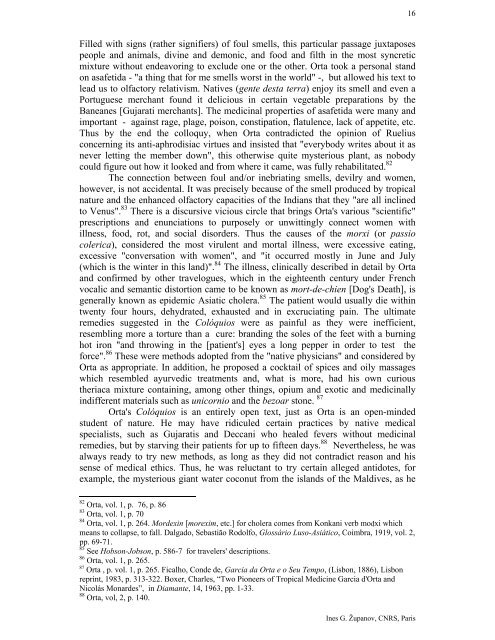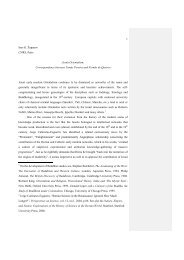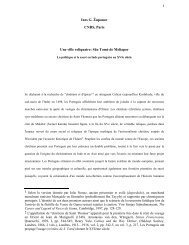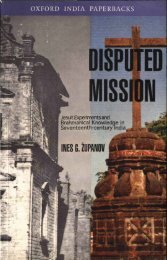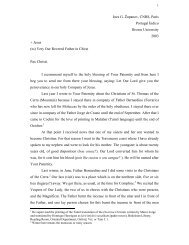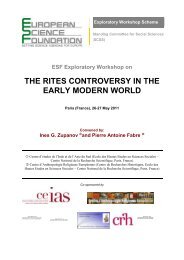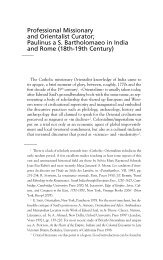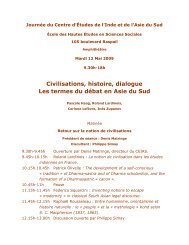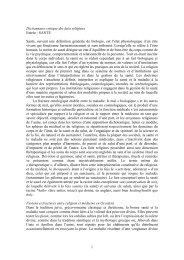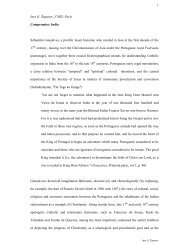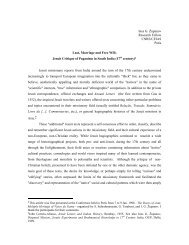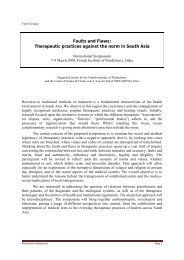Drugs, Health, Bodies and Souls in the Tropics ... - Ines G. Županov
Drugs, Health, Bodies and Souls in the Tropics ... - Ines G. Županov
Drugs, Health, Bodies and Souls in the Tropics ... - Ines G. Županov
Create successful ePaper yourself
Turn your PDF publications into a flip-book with our unique Google optimized e-Paper software.
16<br />
Filled with signs (ra<strong>the</strong>r signifiers) of foul smells, this particular passage juxtaposes<br />
people <strong>and</strong> animals, div<strong>in</strong>e <strong>and</strong> demonic, <strong>and</strong> food <strong>and</strong> filth <strong>in</strong> <strong>the</strong> most syncretic<br />
mixture without endeavor<strong>in</strong>g to exclude one or <strong>the</strong> o<strong>the</strong>r. Orta took a personal st<strong>and</strong><br />
on asafetida - "a th<strong>in</strong>g that for me smells worst <strong>in</strong> <strong>the</strong> world" -, but allowed his text to<br />
lead us to olfactory relativism. Natives (gente desta terra) enjoy its smell <strong>and</strong> even a<br />
Portuguese merchant found it delicious <strong>in</strong> certa<strong>in</strong> vegetable preparations by <strong>the</strong><br />
Baneanes [Gujarati merchants]. The medic<strong>in</strong>al properties of asafetida were many <strong>and</strong><br />
important - aga<strong>in</strong>st rage, plage, poison, constipation, flatulence, lack of appetite, etc.<br />
Thus by <strong>the</strong> end <strong>the</strong> colloquy, when Orta contradicted <strong>the</strong> op<strong>in</strong>ion of Ruelius<br />
concern<strong>in</strong>g its anti-aphrodisiac virtues <strong>and</strong> <strong>in</strong>sisted that "everybody writes about it as<br />
never lett<strong>in</strong>g <strong>the</strong> member down", this o<strong>the</strong>rwise quite mysterious plant, as nobody<br />
could figure out how it looked <strong>and</strong> from where it came, was fully rehabilitated. 82<br />
The connection between foul <strong>and</strong>/or <strong>in</strong>ebriat<strong>in</strong>g smells, devilry <strong>and</strong> women,<br />
however, is not accidental. It was precisely because of <strong>the</strong> smell produced by tropical<br />
nature <strong>and</strong> <strong>the</strong> enhanced olfactory capacities of <strong>the</strong> Indians that <strong>the</strong>y "are all <strong>in</strong>cl<strong>in</strong>ed<br />
to Venus". 83 There is a discursive vicious circle that br<strong>in</strong>gs Orta's various "scientific"<br />
prescriptions <strong>and</strong> enunciations to purposely or unwitt<strong>in</strong>gly connect women with<br />
illness, food, rot, <strong>and</strong> social disorders. Thus <strong>the</strong> causes of <strong>the</strong> morxi (or passio<br />
colerica), considered <strong>the</strong> most virulent <strong>and</strong> mortal illness, were excessive eat<strong>in</strong>g,<br />
excessive "conversation with women", <strong>and</strong> "it occurred mostly <strong>in</strong> June <strong>and</strong> July<br />
(which is <strong>the</strong> w<strong>in</strong>ter <strong>in</strong> this l<strong>and</strong>)". 84 The illness, cl<strong>in</strong>ically described <strong>in</strong> detail by Orta<br />
<strong>and</strong> confirmed by o<strong>the</strong>r travelogues, which <strong>in</strong> <strong>the</strong> eighteenth century under French<br />
vocalic <strong>and</strong> semantic distortion came to be known as mort-de-chien [Dog's Death], is<br />
generally known as epidemic Asiatic cholera. 85 The patient would usually die with<strong>in</strong><br />
twenty four hours, dehydrated, exhausted <strong>and</strong> <strong>in</strong> excruciat<strong>in</strong>g pa<strong>in</strong>. The ultimate<br />
remedies suggested <strong>in</strong> <strong>the</strong> Colóquios were as pa<strong>in</strong>ful as <strong>the</strong>y were <strong>in</strong>efficient,<br />
resembl<strong>in</strong>g more a torture than a cure: br<strong>and</strong><strong>in</strong>g <strong>the</strong> soles of <strong>the</strong> feet with a burn<strong>in</strong>g<br />
hot iron "<strong>and</strong> throw<strong>in</strong>g <strong>in</strong> <strong>the</strong> [patient's] eyes a long pepper <strong>in</strong> order to test <strong>the</strong><br />
force". 86 These were methods adopted from <strong>the</strong> "native physicians" <strong>and</strong> considered by<br />
Orta as appropriate. In addition, he proposed a cocktail of spices <strong>and</strong> oily massages<br />
which resembled ayurvedic treatments <strong>and</strong>, what is more, had his own curious<br />
<strong>the</strong>riaca mixture conta<strong>in</strong><strong>in</strong>g, among o<strong>the</strong>r th<strong>in</strong>gs, opium <strong>and</strong> exotic <strong>and</strong> medic<strong>in</strong>ally<br />
<strong>in</strong>different materials such as unicornio <strong>and</strong> <strong>the</strong> bezoar stone. 87<br />
Orta's Colóquios is an entirely open text, just as Orta is an open-m<strong>in</strong>ded<br />
student of nature. He may have ridiculed certa<strong>in</strong> practices by native medical<br />
specialists, such as Gujaratis <strong>and</strong> Deccani who healed fevers without medic<strong>in</strong>al<br />
remedies, but by starv<strong>in</strong>g <strong>the</strong>ir patients for up to fifteen days. 88 Never<strong>the</strong>less, he was<br />
always ready to try new methods, as long as <strong>the</strong>y did not contradict reason <strong>and</strong> his<br />
sense of medical ethics. Thus, he was reluctant to try certa<strong>in</strong> alleged antidotes, for<br />
example, <strong>the</strong> mysterious giant water coconut from <strong>the</strong> isl<strong>and</strong>s of <strong>the</strong> Maldives, as he<br />
82 Orta, vol. 1, p. 76, p. 86<br />
83 Orta, vol. 1, p. 70<br />
84 Orta, vol. 1, p. 264. Mordex<strong>in</strong> [morexim, etc.] for cholera comes from Konkani verb moîxi which<br />
means to collapse, to fall. Dalgado, Sebastião Rodolfo, Glossário Luso-Asiático, Coimbra, 1919, vol. 2,<br />
pp. 69-71.<br />
85 See Hobson-Jobson, p. 586-7 for travelers' descriptions.<br />
86 Orta, vol. 1, p. 265.<br />
87 Orta , p. vol. 1, p. 265. Ficalho, Conde de, Garcia da Orta e o Seu Tempo, (Lisbon, 1886), Lisbon<br />
repr<strong>in</strong>t, 1983, p. 313-322. Boxer, Charles, “Two Pioneers of Tropical Medic<strong>in</strong>e Garcia d'Orta <strong>and</strong><br />
Nicolás Monardes”, <strong>in</strong> Diamante, 14, 1963, pp. 1-33.<br />
88 Orta, vol, 2, p. 140.<br />
<strong>Ines</strong> G. <strong>Županov</strong>, CNRS, Paris


